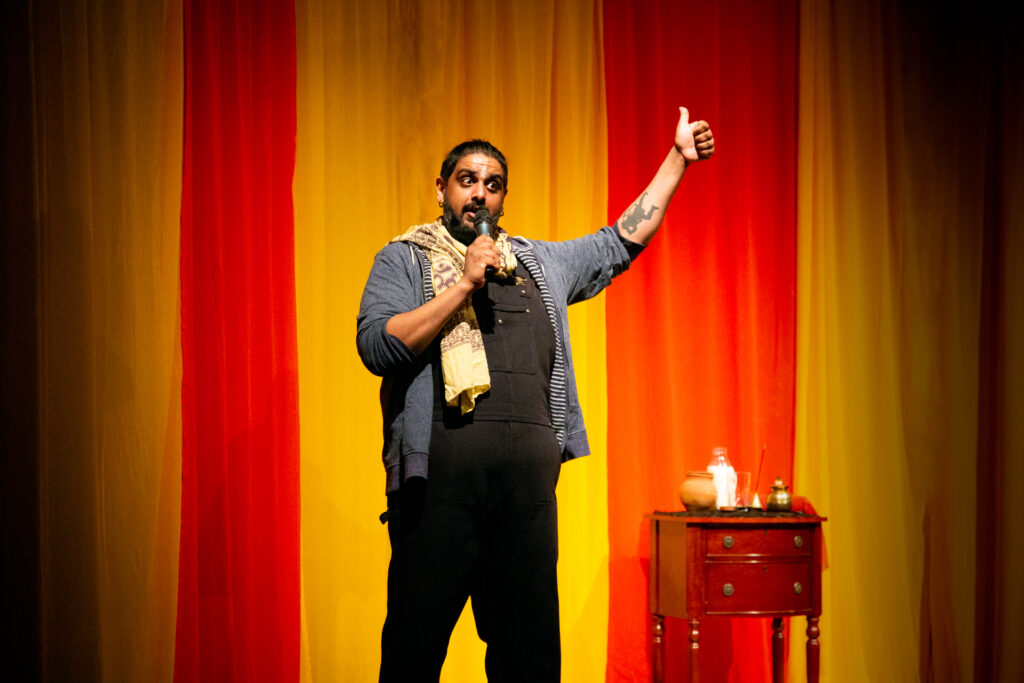
In his play Take D Milk, Nah?, which recently played to a sold-out crowd at Alderney Landing in his hometown of Dartmouth, Jivesh Parasram makes the case that there is something inherently Canadian about an “identity play,” but also often something intrinsically colonial.
A friend told me once that there are folks in Scotland who find it bizarre that Nova Scotians whose Scottish ancestors emigrated in the late 1700s still identify so ardently with Scottish culture and identity. Shouldn’t we just be “Canadian” by now? But, obviously, here in Mi’kma’ki it’s definitely not that simple. For most of us our identities intersect, and our ancestors came here from somewhere else, in various different contexts that many of us likely both know and don’t, and now we are connected to a different place, whose own traditions, cultures, and history have been aggressively written over for over five hundred years. And for most of us our ancestors were complicit, to varying degrees, in this violence and erasure. There is a lot for us to write and talk about. Of course, since Imperialism, especially British Imperialism, extends far beyond Canada, Canadians are far from the only folks for whom identity is complex. Parasram speaks about being Indo-Caribbean-Canadian, and charts the reasons why his ancestors moved from India to Trinidad, and the ways in which this is also a complex intersection of identities.
I learned a lot from Parasram in his playful and inviting way about India and about Trinidad that I had never encountered before either in school or in the media we continually consume once we have graduated. He makes it explicitly okay in this space to be ignorant to these things, to be open to receiving new information, and also, to seeing things in a more nuanced way, or from a completely different perspective. He provides a safe place to learn, while also making sure you are being entertained with ample charm, a fun mix of music, and a harrowing, poignant, and dynamic story about a cow, which acts as a kind of anchor for the piece.
Most identity plays, Parasram argues, centre stories that show the protagonist as both “other” and “same,” in an attempt to send the audience out into the night feeling good about how they watched this story about someone who looked different on the outside, but they learned we are all really the same on the inside, and isn’t that lovely. What a wonderful time to be alive in Canada! Parasram gives us part of this, he gives us the humour and the pathos that we in the audience want to connect to, but he doesn’t allow us to wrap the evening up in a simple, easy little bow, nor to pat ourselves on the back, absolving ourselves of the Imperial/Colonial mess of the world. He encourages us to stare at that mess, to take in that mess, but also to not see it in terms of “your ancestors were bad” and “my ancestors were good” or “you are the majority” and “I am the minority” either. The messiness is nuanced. Broad strokes create more problems.
The play also delves into the way layers of identities create nuance, and how the context of where someone is also plays a part creates shifting experiences for folks. For example, Hindu is the most common religion in India, but it is the second largest in Trinidad, and the third largest in Canada, which of course plays a shifting role in how someone’s identity is constructed as they move from being part of the majority to part of a minority. For Parasram being a Brown teenager in Dartmouth on September 11, 2001 also had infuriating and heartbreaking ramifications, which influenced the way he saw himself in relation to others, both in terms of his white neighbours, but also his Muslim neighbours. In what problematic ways do we construct our identities specifically to fit in, or even just to survive?
The audience in Dartmouth last week seemed very open and receptive to hearing everything Parasram had to say, to take in the humour and the seriousness, to help make the theatre a safe space to encounter hard things. The conversations in the lobby afterward were enthusiastic, not about how great it was that we had solved all the things, but in how generously we had been given an honest opportunity to try to think in more multifaceted ways, without shame or guilt making our knee-jerk reaction defensiveness.
It is ironic that the theatre company presenting Take D Milk, Nah? is called Pandemic Theatre (it was founded in 2009) because this play is a beautiful example of what we can do in a room together, that we can’t do as effectively in any other medium. There is a power in us all sitting in the dark together and trying to unravel ancient intricate knots, and giving one another our undivided attention. At this juncture in 2023, I think many of us are holding on to these special experiences even more ardently.
Take D Milk, Nah? is a Pandemic Theatre/Rumble Productions show. It played at Eastern Front Theatre (Dartmouth, Nova Scotia) for one night only on March 29th. It is currently at the Highland Arts Theatre (Sydney, Nova Scotia) tonight (April 6), visit this website for more information. It is then at Theatre New Brunswick (Fredericton, New Brunswick) April 13th to 15th, for more information visit this website.





 World Theatre Day: My God Is It Ever The Time to Invest in Canadian Plays
World Theatre Day: My God Is It Ever The Time to Invest in Canadian Plays 
1 thought on “Take D Milk, Nah?: On Nuance, Cows & Colonialism”
Comments are closed.